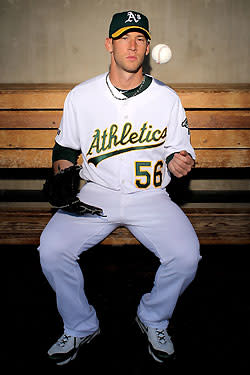A’s pitcher Breslow is a bighearted brainiac
The smartest man in baseball recoils at being called the smartest man in baseball. It sounds too pompous, too arbitrary. And then Craig Breslow(notes) starts waxing on about the wonders of DNA sequencing, and his Oakland Athletics teammates hoot and holler as they throw a miniature Nerf football around the clubhouse, and, well, some truths are self-evident, one of them being that these men were not created equal.
So it's no surprise that the smartest man in baseball is on a mission: He wants to eradicate a disease. Lofty goal for anyone, let alone someone who spends his days as a relief pitcher, and yet Breslow doesn't give up easily. He graduated from Yale, got drafted, almost went to med school at NYU, bounced around the minors, made it to the big leagues, bounced around there as well, won a World Series and, now that he's a big leaguer for good, gladly uses the pulpit afforded to major leaguers.
And since it is Childhood Cancer Awareness Month, Breslow has a story to tell about his sister, Lesley. Doctors found tumors on her thyroid and in her lymph nodes when she was 13. Surgery removed them, the cancer never returned and she's been in remission for nearly two decades. Still, the experience embedded itself in Breslow's psyche: "It's really hard to turn your back on sick children."
Breslow never did. First through genetic research in previous offseasons, and today with his Strike 3 Foundation, Breslow exemplifies the athlete who doesn't just parrot a cause because it sounds good. He lives it, breathes it and obsesses over it, far more than his earned-run average (a well-above league-average 3.31) or strikeouts (nearly one an inning). In the two years since starting Strike 3, Breslow has raised more than a quarter million dollars, and the foundation's $100,000-a-year grant allowed Smilow Cancer Hospital at Yale to start a Pediatric Bone Marrow Transplant Program.
"I don't think I could have the success at one without the other," Breslow said. "The work I do off the field isn't necessarily a distraction, but it makes me realize there are more important things than getting an out or giving up a hit. And I've noticed the more success I have on the field, the more response to our cause."
The fashion in which Breslow runs the foundation isn't exactly ripped from leadership manuals. Between 1 p.m. and 11 p.m., he's stuck at the field. After a game, he'll send ideas to Joe Lizza, an old friend and the charity's manager in Connecticut, where Breslow spends his offseasons. Lizza occasionally will reply when Breslow is still up, at 3 a.m. PT, and they'll pore over everything from potential donors to gifts beyond the bone marrow center.
"What he's able to do is bridge baseball and the business world seamlessly," A's starter Dallas Braden(notes) said. "A lot of guys aren't able to do that, and his ability to provide a remarkable service and an example for so many people is amazing.
"But he's not that smart. He fakes it well."
Breslow faked it well enough for ICAP, a trading firm, to include Strike 3 in its lucrative charity day this year. And this year's success likely will allow Breslow to hand out satellite grants on behalf of the foundation.
He even convinced A's reliever Andrew Bailey(notes), last year's AL Rookie of the Year, to take a board position as director of development. Asked what he has developed thus far, Bailey said: "My own money. Because Craig seems like he does everything else on his own. He talks to everybody. He deals with [problems] himself. We call him The Wizard. He's smart, he's the best cribbage player I know, he runs a foundation and he can pitch, too. Not anyone can go to Yale. And not anyone at Yale can study molecular bio … biophy … bio-whatever-it-is."
It's molecular biophysics and biochemistry, for the record, and while Breslow may be past his days inside a laboratory, his altruism remains strong. He was nominated for the Roberto Clemente Award this year, meant to honor on-field accomplishments as well as community endeavors. Unfortunately, pitching in relief for a .500 team isn't exactly the formula for victory.
Rather than focus on contributions both charitable and intangible – "This is a young clubhouse," A's starter Trevor Cahill(notes) said, "and we need a guy like him" – the committee skews toward the biggest name. Of the 39 previous winners of the award, only Garry Maddox was never an All-Star, and he won eight Gold Gloves. A half-dozen All-Stars from this season are on the ballot, and Breslow understands what that means.
In all likelihood, he'll have to wait another year or two or five or more. He's 30, and since he's left-handed and alive, Breslow could very well pitch another decade, so he's willing to wait, to keep putting the Strike 3 name out there and strive to become a new standard bearer of baseball charities, following the Moyer Foundation, through which pitcher Jamie Moyer(notes) has donated more than $20 million to help children.
"We're committed to this cause," Breslow said, "and we're going to see it through."
Though he may not cure cancer, the smartest man in baseball will try. And by now people should know not to doubt him.


